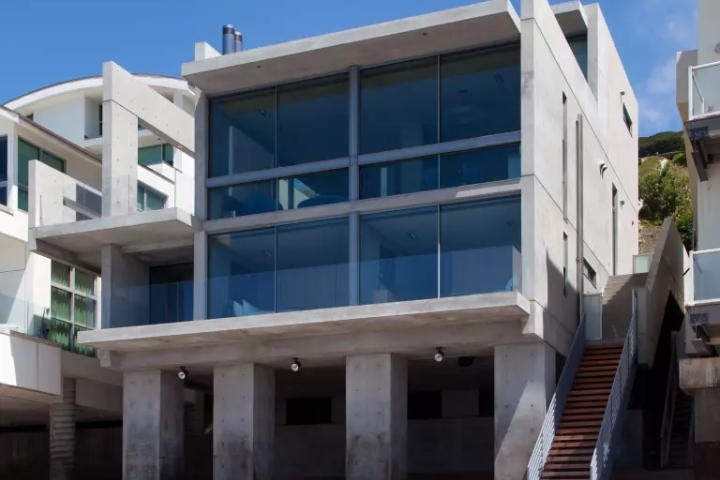CELEBRITY
Kanye West Bought an Architectural Treasure—Then Gave It…see more

Kanye West Bought an Architectural Treasure—Then Gave It a Violent Remix
How the hip-hop star’s beautiful, dark, twisted fantasy turned a beach house in Malibu, designed by the Japanese master Tadao Ando, into a ruin.
Tony Saxon is a wiry, tattooed man in his early thirties who is proud of what he calls his “Jersey gonzo” work ethic—that is, “I’ve got a guy, or I’ll get a guy.” His legal surname is Netelkos, but he prefers the one that his father adopted while performing as a lounge singer with an Elvis-inspired act. The younger Saxon had a sometimes chaotic and druggy youth; he now sustains himself with Red Bull and can talk loudly and without interruption—but still with some charm—for four or five hours. When we recently met in Boyle Heights, in East Los Angeles, he arrived in a 1963 Ford Thunderbird convertible.
Four years ago, Saxon moved to California from northern New Jersey and sublet an apartment in North Hollywood. He worked on TV commercials and as a handyman; he played in bands and recorded music. In September, 2021, a woman who introduced herself as Bianca inquired about his availability for construction work. He was available. A few days later, she texted, asking him to come to Malibu immediately. In a response that eventually led to a lawsuit against Ye, formerly Kanye West—the music and fashion star who in the past two years has become known for his public antisemitism and admiration of Hitler—Saxon said that he’d get his tools.
He drove down to the Santa Monica Pier, then headed northwest on the Pacific Coast Highway. For about ten miles, the road follows the ocean’s edge: if you live on the beach, you also live next to a four-lane highway. But just past the Malibu Pier the highway and the ocean separate, and for a few miles the beachfront properties line a calm residential street, Malibu Road, with speed bumps and dog-walkers. Stan Laurel used to live here.
The houses stand shoulder to shoulder, allowing little more than a glimpse of sky between them. Saxon pulled up to a two-story façade of smooth gray concrete. On the upper floor, the surface was interrupted only by an arrow-slit window; at street level, there was a wooden garage door, and a front door and a window, both made of milkily opaque glass.
A few months earlier, when the house had had a different owner, a visitor would have entered a little gallery-like space, with concrete walls and gray limestone floor tiles, filled with contemporary art. The house withholds its big Pacific reveal, and the clouded glass casts the gallery in pale light. The art here once included photographs of nuclear-weapons-test clouds and a life-size statue of a man, no longer in his youth, with his fists in a boxer’s pose. The sculpture, cast in aluminum and painted blue, is by the French artist Xavier Veilhan. It is a likeness of Tadao Ando, the Pritzker Prize-winning Japanese architect.
Ando, who had a brief boxing career, designed the house. Now eighty-two, he has kept his practice small. He has one office, in his home city of Osaka, and has never employed more than thirty people. He works on only a few designs each year. Some are museums; many are houses; nearly all, including the house on Malibu Road—finished in 2013, for Richard Sachs, a former money manager—are made of concrete, poured on-site, and left unclad and unpainted, indoors and out. In what has become an Ando signature, the concrete’s velvety surface is marked by evenly spaced holes—small and shallow enough to be plugged by, say, a marshmallow.
The Malibu Road house has about four thousand square feet of indoor space. Another property of this scale, on this street, might sell for twenty million dollars. When Sachs put his house on the market, in 2020, he asked for seventy-five million. Sachs’s price, like his aluminum statue, suggests the extent to which an appreciation of Ando can take the form of veneration. For very wealthy people who spend some of their wealth on art, no living architect seems more likely to make them feel that they’re buying not just a fine home but the work of a major modern artist. An Ando house will require expensive and exacting construction; it will have a controlled, sober beauty that photographs well and that plainly communicates contemporary, if not avant-garde, taste. And it will be rare. The client will receive personal validation of the most tangible, bombproof kind. Ando has said that, after being introduced to potential clients, “my decision to accept their projects depends mainly on their personality and aura.” An American real-estate agent who has had some interactions with Ando recently told the Wall Street Journal that “it was like working with God.”
Saxon was let into the Malibu Road house by Bianca Censori, the woman who had texted him; she was in her twenties. The house is a box partially embedded in the continent’s last, low step of land. The structure then stretches over the sand, propped up by four pillars at about the high-tide mark. (The beach here is narrow.) Although the house appears from the street to be two stories, the front door is on the middle of three floors—the main floor. A short corridor leads from the gallery to an open living area where the house delivers its vast, binary view of sky and ocean, through floor-to-ceiling windows.
Censori mentioned that the house, which was empty of furnishings, had a new owner, but she didn’t name him. A few other people were around; they had ladders and tools. One or two were identified as co-workers of Censori’s and, like her, were dressed all in black. Others, like Saxon, had been summoned that day. Walking around, Saxon registered bathroom walls lined in marble—“gorgeous black-and-white marble, like something in a New York hotel in the nineteen-twenties,” he told me—and custom wooden cabinetry that, he estimated, had cost hundreds of thousands of dollars.
Downstairs, the ceilings were lower than on the main floor. Three rooms, each with a little bathroom, had ocean views. There was also a laundry, and a room where Saxon saw devices that controlled the house’s heating and other systems. On the upper floor, two extravagantly wide staircases—more suggestive of a college library than of a beach house—descended to the main floor. One staircase was inside, one was outside: they ran alongside each other, separated by a wall built partly of glass. At the bottom of the outdoor staircase was a courtyard with a fire pit. At the top was a concrete hot tub. The top floor was mostly terrace, with the primary bedroom opening onto it. Sachs once kept a sculpture of the Incredible Hulk, by Jeff Koons, midway up the indoor staircase. In this area, Saxon noticed, Censori’s black-clad colleagues were doing something involving large blocks of foam. He remembered being told that they were turning the stairs into a slide.
Later—as the house’s interior was dismantled—Saxon would spend nights here, sleeping on a mattress on the floor, surrounded by Clif Bars and Red Bulls, and bothered by seagulls. Later still, Censori would become a fixture of the paparazzi-oriented media, as the romantic partner of the house’s owner: Ye. For nearly a year, Censori, who is Australian and had studied architecture at the University of Melbourne, had been working for him on various design projects, alongside other young architects. Saxon saved her number on his phone under “Bianca architect.” (Censori did not respond to requests for comment.)











